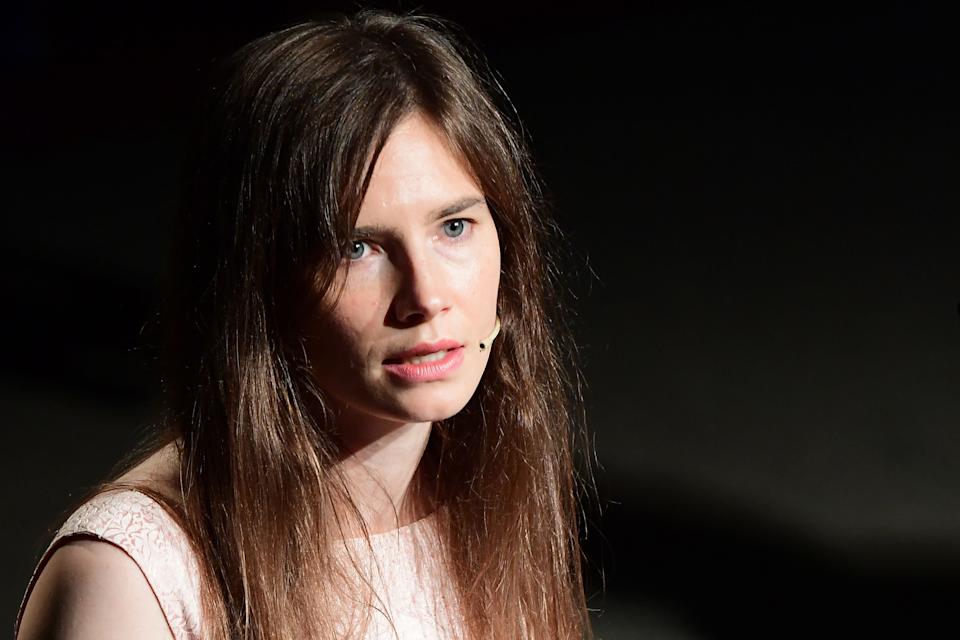Amanda Knox is questioning who gets to tell Britney Spears‘ story in the wake of the documentaries about the singer’s recently terminated conservatorship.
Knox, an exoneree who was wrongfully convicted in the 2007 murder of her study abroad roommate Meredith Kercher, appeared on the iHeartRadio podcast There Are No Girls on the Internet with host Bridget Todd, where she spoke about who gets to shape public figures’ narratives.
Knox, who says the version of herself depicted in the media was not who she really was, questioned whether it was right that Spears, who did not participate in documentaries like The New York Times’ Framing Britney Spears and Controlling Britney Spears, as well as Netflix’s Britney Vs. Spears, did not contribute to these works.
“Did Britney ultimately want her family drama to be so public? She didn’t get a choice in that,” Knox said. “Did it make a difference in her trial, is she grateful for all the people who supported her? Of course. But it is interesting to me, and it is one of those moments where it’s worth pausing and asking, ‘Wait, what is her perspective in all of this?’ Since everything is going to be impacting her the most, shouldn’t she have some kind of say? I’d be curious to know how Britney feels today about the fact that there were documentaries made without her consent and yet, they played a supportive role towards her. That’s an interesting mental space to be in.”
Knox, who hosts the podcast Labyrinths, said she saw parallels between the documentaries and Spears’ conservatorship, which was in place for 13 years, as both suggested they were the authority who would “know what is good” for the artist.
“[It’s the idea of,] ‘We’re going to do this, even if you don’t want us to,'” Knox explained.
Knox previously spoke out about the films made about Spears in a lengthy Twitter thread in Sept. 2021. She pointed out that the issue was complicated because Spears, under her conservatorship, did not have a voice for many years to talk about her unhappiness with her situation. She also noted that the filmmaker behind Britney Vs. Spears took care not to show footage that the Crossroads actress had previously called “traumatizing.”
“Once a person becomes a public figure, should every facet of their life be fair game for infotainment? I’d like to live in a world where Britney, and Britney alone, gets to decide if she wants her personal legal drama to serve as your next Netflix binge,” Knox wrote. “All that said, I’m not condemning the filmmakers who have covered this incredible story. I just think it’s worth pausing to ask the questions I’ve asked here, and whether we should treat the next person, and the next, like we’ve treated Britney her entire life.”
Once a person becomes a public figure, should every facet of their life be fair game for infotainment? I’d like to live in a world where Britney, and Britney alone, gets to decide if she wants her personal legal drama to serve as your next Netflix binge.
— Amanda Knox (@amandaknox) September 29, 2021
In addition to speaking about how Spears may have felt about the documentaries made about her, Knox — who participated in a 2016 Netflix documentary about her case after the filmmakers said they would not make the movie without her participation — criticized the Matt Damon film Stillwater, which was inspired by her wrongful conviction. The film focused on the “girl-on-girl sex crime” that dominated the headlines during Knox’s trial. Knox questioned why the filmmakers never reached out after she made her disapproval known.
“It’s too bad because my position in all of this is, I’m really easy to talk to. I think we could have a really worthwhile conversation here,” she explained. “I feel like maybe I was overlooked, but here’s an opportunity to not overlook me. Let’s talk about that. And nothing — just crickets. They’ve moved on to the next story, and it doesn’t matter that there are repercussions in my life. It’s just insane. You’re a storyteller. Your whole job is to be able to empathize with the human experience, and be able to tell a story that resonates with people, and yet, here’s a real human being going like, ‘Hey, I’m over here, call me,’ and, no.”




